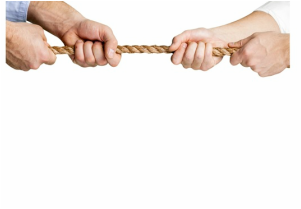|
Growing up, my sister and I fought a lot. I'm sure we drove our parents crazy, bickering about one perceived slight or another--who stole the purple Barbie Corvette, whose turn it was to sit in the front seat--really important stuff like that.
When frazzled adults attempted to intervene, we would immediately attempt to soften the blow of justice by casting ourselves in the role of victim. "She started it!" or "It was all her fault!" These battle cries did little to exonerate us. More frequently, they got us both into more trouble. I am now a mother and witness to my children's whodunnit capers. At twelve and fourteen, when they disagree, it is imperative my children determine whose fault it is or who started it. Back and forth they lob the blame, desperate to "win," until they tire or I go all "Scary Mommy" on them, whichever comes first (hint: it's usually the latter). Thirty-five years later, my children picked up the argument right where my sister and I left it. With underdeveloped egos, children play the blame game because they don't know any better. For them, a complex world is made simpler when viewed through lenses of right and wrong. Why then, in conflict, do adult family members, lovers, or friends (who know better) dissolve into enemies over seemingly trivial things? The answer is both simple and complex. Conflict exposes our unmet needs for love, acceptance, or acknowledgement. The more intense the conflict, the deeper the unmet need. Acute awareness of this hunger makes us feel ashamed. We attack others so they won't notice how vulnerable we are. Acknowledgement and understanding open our channels for love; self-righteousness closes them. Dividing arguments into factions of winners and losers is a betrayal of our hunger. Every time we point our finger away from ourselves, we are unconsciously telling love where to go. If it is love we crave the most, when we are wounded, we must be brave enough to step off the mat, first toward ourselves, then toward each other. While there is no prescriptive formula for this, here are a few things to consider: 1. Know when you are triggered and take care of yourself. "The red zone" (increased heart rate, blood pressure, unclear thinking, etc.) is your body's way of signaling you to stop and pay attention to your own unmet needs. When you start to feel overwhelmed, tell the person with whom you are in conflict that you need to take a quick break to settle yourself. Twenty minutes is usually enough time to reduce cortisol (aka stress hormone) levels and restore clear thinking. When you are calm, ask yourself what you really want. 2. Consider both sides. Compassion inches us toward connection. Like you, the human with whom you are arguing is also lugging around a suitcase full of his or her own unmet needs. You already know your side of the story. Practice arguing his or hers: how might s/he feel? What might s/he want? Exploring another's perspective does not mean we agree with it. It simply means we are open to considering someone else's point of view. Sometimes, feeling heard is enough to convince both parties to drop the rope. 3. Depersonalize outcomes. Ask respectfully for what you want. This does not mean that you will get it. Rarely is this personal. Remember: all disappointment is an invitation to attend to our own hunger. Offer yourself the love you seek from another. 4. This too is temporary. This "thing" that seems so important right now? It will eventually pass. Every feeling we have is designed to last approximately 60-90 seconds. That's it! 5. Set an intention for change and give it time. Like a scab, anxiety can tempt us to pick at a situation that would otherwise heal nicely on its own. Not knowing what to do right now could mean that both time and nature need to work their magic. Set this down for a while. You can always come back to it later. All you need to know right now is that you are open to resolution. 6. You're in this together. All relationships are co-created. You alone are not responsible for fixing any relationship. Resolution requires participation from both parties. There is no shame in hunger. Wrap your arms around whatever it is you yearn for. When we hold ourselves accountable for our own unmet needs, conflict does not divide us. It helps us find each other! Dr. Jill Gross is a licensed psychologist, therapist, and counselor. She offers grief therapy, divorce support, and other counseling services in the Phinney Greenwood area of Seattle, WA. Is your relationship being torn apart by conflict? Schedule a free consultation to find out how therapy or counseling can help put things back together.
2 Comments
Dr Jill,
Reply
Dr. Jill
10/5/2016 03:10:51 pm
Good catch, Roocifer! I wish I could say that this was something more interesting than a careless oversight. But that would be untrue.
Reply
Your comment will be posted after it is approved.
Leave a Reply. |
AuthorDr. Jill Gross is a licensed psychologist, specializing in grief and divorce. Her coaching and therapy practice is located in the Phinney - Greenwood area of North Seattle in Washington. Archives
May 2021
Categories
All
|
HoursM-TH: 8:30 AM - 2:00 PM.
By Appointment Only |
Telephone & Email |
Address503 N. 50th Street
Seattle, WA 98103 |
*Header Photographs courtesy of Josh Martin



